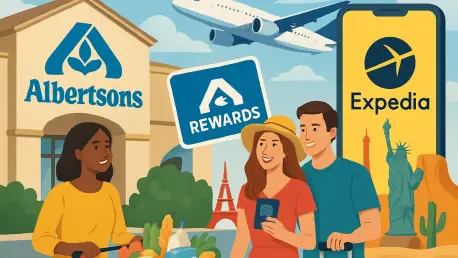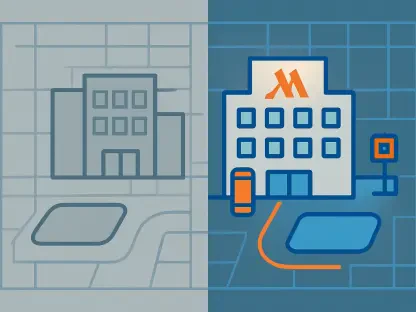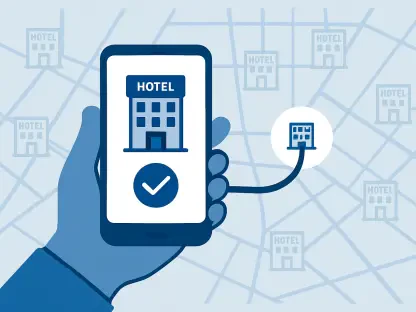Imagine a world where booking a dream vacation could directly cut down your grocery bill, a concept that is no longer just a distant idea but a reality through a strategic alliance between Albertsons, a major supermarket chain, and Expedia, a leader in travel booking services. This partnership introduces a groundbreaking dimension to loyalty programs by linking travel rebates with everyday grocery savings, capturing the attention of both the retail and travel industries. The significance of this move lies in its potential to reshape how consumers perceive value in loyalty programs, moving beyond traditional discounts to encompass broader lifestyle benefits. This analysis dives into the market trends driving such cross-industry collaborations, examines the mechanics and impact of this specific initiative, and projects its influence on the future of retail engagement strategies.
Market Trends: The Shift Toward Lifestyle-Oriented Rewards
Expanding Horizons in Loyalty Programs
The retail sector has witnessed a profound transformation in loyalty programs over recent years, as supermarkets face mounting pressure to differentiate themselves in a highly competitive landscape. No longer confined to simple discounts on groceries or fuel, loyalty initiatives are increasingly embracing non-traditional rewards that align with diverse consumer needs. Albertsons’ collaboration with Expedia exemplifies this trend, tapping into the travel sector—a domain typically disconnected from food retail—to offer cash-back benefits on bookings. This shift reflects a broader market movement where retailers aim to create deeper emotional connections with customers by rewarding experiences rather than just transactions, a strategy gaining traction across various consumer segments.
Consumer Demand for Versatile Benefits
Driving this evolution is a clear consumer appetite for rewards that extend beyond the store aisles. Recent data from an extensive global survey conducted by a leading travel platform indicates that over 80% of respondents are open to arranging travel through non-traditional loyalty programs, with 43% showing strong enthusiasm. This growing acceptance underscores a pivotal change in market dynamics, where value is increasingly defined by versatility and relevance to personal lifestyles. Retailers like Albertsons are capitalizing on this sentiment, positioning themselves as innovators by integrating travel perks that cater to a demographic eager to merge daily necessities with aspirational spending, thereby enhancing program appeal.
Cross-Industry Partnerships as a Competitive Edge
The rise of cross-industry partnerships marks another critical trend shaping the retail loyalty landscape. By aligning with sectors like travel, entertainment, or wellness, retailers can offer unique value propositions that stand out in a crowded market. Albertsons’ initiative is a prime example, leveraging Expedia’s technology to provide seamless access to travel bookings while tying rewards back to grocery purchases. Such collaborations not only boost customer retention but also attract new members seeking comprehensive benefits, setting a benchmark for competitors. As this trend gains momentum, the market is likely to see more retailers exploring unconventional alliances to stay relevant and drive engagement.
Deep Dive: Albertsons’ For U Travel Feature
Mechanics of Earning and Redeeming Rewards
At the core of this partnership is the For U Travel feature within Albertsons’ loyalty program, a mechanism designed to bridge grocery shopping with travel spending. Members can earn cash back on various travel expenses—up to 5% on hotel stays, vacation packages, activities, and ground transportation, and 1% on flights—which can be redeemed as grocery credits approximately 40 days after travel completion. For subscribers to the premium FreshPass tier, priced at $12.99 monthly or $99 annually, these rates double, creating a strong incentive for deeper program engagement. While currently redeemable online, plans for in-store redemption aim to enhance convenience, though the delayed timeline for accessing credits may pose a challenge to immediate gratification.
Membership Growth and Program Enhancements
Albertsons’ loyalty program has shown robust growth, with membership in the For U program surpassing 47 million, reflecting a 14% increase year-over-year in the first quarter of the current fiscal period. This expansion is supported by recent updates, such as a transition to a points-only redemption system and increased flexibility in how rewards can be used. The integration of travel rebates through Expedia’s platform further elevates the program’s value, positioning Albertsons as a leader in loyalty innovation. However, regional variations in technology adoption and awareness could hinder uniform rollout success, highlighting the need for targeted marketing to maximize participation across diverse markets.
Market Reception and Potential Challenges
The reception of such non-traditional rewards hinges on consumer willingness to adapt to new booking channels through retail loyalty platforms. The strong interest indicated by survey data suggests a favorable outlook, yet the complexity of navigating travel bookings via a grocery-based program could deter some users if not streamlined effectively. Albertsons must address potential friction points, such as user interface clarity and redemption delays, to ensure widespread adoption. Despite these hurdles, the initiative’s alignment with a growing demand for experiential benefits offers a significant opportunity to capture a broader customer base, particularly among travel enthusiasts.
Future Projections: The Evolution of Retail Loyalty Ecosystems
Anticipated Growth in Cross-Sector Collaborations
Looking ahead, the retail loyalty market is poised for a surge in cross-industry collaborations, with partnerships extending into areas like streaming services, fitness, and beyond. Albertsons’ venture with Expedia sets a precedent for how retailers can leverage technology and data analytics to personalize rewards, catering to individual consumer lifestyles. Projections suggest that by 2027, a significant portion of loyalty programs will incorporate multi-sector benefits, driven by advancements in integration platforms and consumer demand for holistic value. This trajectory indicates a future where loyalty ecosystems transcend core business offerings, creating interconnected reward networks.
Economic and Regulatory Influences
Economic factors, such as inflation, are expected to influence consumer reliance on loyalty programs for maximizing value across spending categories. As purchasing power fluctuates, programs offering tangible savings through diverse rewards will likely see heightened engagement. Simultaneously, regulatory scrutiny on data privacy may impact how retailers structure partnerships, necessitating robust safeguards to maintain trust. Balancing innovation with compliance will be critical for market players aiming to expand loyalty offerings, ensuring that data-driven personalization does not compromise consumer confidence in an increasingly regulated environment.
Strategic Implications for Retailers
For retailers, the evolving loyalty landscape presents both opportunities and challenges. Those who invest in user-friendly interfaces, timely reward mechanisms, and strategic alliances will likely lead the market in customer retention. Albertsons’ early adoption of travel rewards could inspire competitors to accelerate their own cross-category initiatives, intensifying competition. Additionally, tailoring benefits to regional preferences and leveraging predictive analytics to anticipate consumer needs will be key differentiators. The market is set to reward agility and innovation, pushing retailers to continuously redefine engagement strategies over the coming years.
Reflecting on Insights: Strategic Pathways Forward
Looking back, the analysis of Albertsons’ partnership with Expedia highlighted a transformative moment in retail loyalty, where grocery savings intertwined with travel rebates to meet modern consumer expectations. The robust membership growth and positive market reception underscored the potential of cross-industry rewards to drive engagement. For retailers, the takeaway was clear: diversifying loyalty offerings through strategic alliances offered a powerful tool to stand out. Moving forward, businesses should prioritize seamless integration of such benefits, invest in educating consumers about non-traditional rewards, and explore partnerships in emerging sectors to sustain momentum. For consumers, actively engaging with evolving loyalty programs could unlock unexpected value, turning everyday spending into broader lifestyle savings. This partnership paved the way for a reimagined retail landscape, urging all stakeholders to adapt and innovate.









